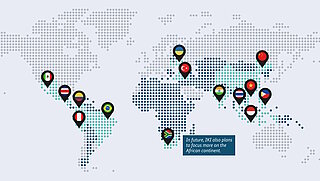Cooperation between the IKI and its partner countries
Last updated: May 2024
With the International Climate Initiative (IKI), the German government promotes projects with maximum impact for climate action and biodiversity conservation, in particular through ideas competitions. To this end, it has developed the IKI Strategy 2023, which sets clear geographical and thematic priorities: The IKI concentrates its funding primarily on its priority countries and strategic fields of action.
Global justice in joint crisis management
The idea behind this is that the global community can only overcome the climate and biodiversity crisis if all countries pull together – and make their own contribution depending on their respective situation. In the spirit of global justice, the industrialised countries have a particular responsibility in this regard because, while developing countries have contributed little to global warming to date, they are particularly badly affected by the consequences.
At the same time, emissions are rising rapidly, particularly in emerging economies. The IKI therefore supports emerging economies and developing countries in those areas where it can have the greatest possible impact with the available resources.
IKI Strategy 2030
Further Links
The geographical focus of the IKI from 2024 onwards
Selection of partner countries
In principle, all recipient countries of official development assistance (ODA) from the Organisation for Economic Co-operation and Development (OECD) are eligible for selection as IKI partner countries.
From 2024, the IKI will focus its cooperation on certain priority countries, which it has selected according to the following criteria:
- high and/or rapidly increasing greenhouse gas emissions;
- great importance for global biodiversity conservation;
- regional pioneers characterised by a strong political commitment to climate and biodiversity protection.
The IKI priority countries
The IKI priority countries include Brazil, China, Colombia, Costa Rica, India, Indonesia, Mexico, Peru, the Philippines, South Africa, Thailand, Türkiye, Ukraine and Viet Nam.
Together, these 14 countries already account for almost 50 percent of global greenhouse gas emissions and around 80 percent of emissions from developing and emerging countries. The IKI priority countries are also home to 25 of the global biodiversity hotspots, where an exceptionally high concentration of endemic species is affected by significant habitat loss. Climate change is further intensifying this effect. These hotspots contain the remaining habitats of 44 percent of all plant species and 35 percent of all vertebrate species worldwide.
The IKI aims to concentrate around 80 percent of funding commitments for bilateral projects on its priority countries by 2030. This means that work with these 14 partner countries will be gradually intensified.
The selection of priority countries will be adjusted on the basis of the above criteria if conditions change. This applies in particular to the IKI’s involvement in Africa. Despite the continent’s great importance for global climate and biodiversity protection, only one African country, South Africa, is currently defined as an IKI priority country.
Interface projects for political and professional networking in the region
Most of the priority countries feature IKI interface projects that operate offices in the capital cities. In addition to their own country-specific project mandate, the tasks of the interface projects include
- working in close cooperation with the ministries responsible for climate, energy and biodiversity and the German embassies on the ground, and
- networking all IKI projects in the country and thus promoting synergies for project work.
IKI Country Calls
Since 2017, the IKI has been organising country-specific, bilateral funding calls (known as IKI Country Calls) together with the partner governments in most of the priority countries. These country calls aim to concentrate efforts on one or two climate or biodiversity issues that are particularly important for the specific partner government.
They are developed together with the political partners in the relevant countries and draw on the national priorities of the partner governments (e.g. NDC, NBSAP, NAP) for the global processes.
Further information on the country calls and the current status of the proceedings can be found here.
IKI interface projects
- Climate Policy Programme Brazil (PoMuC)
- Sino-German Cooperation on Climate Change – NDC Implementation
- ACCION Clima III - NDC implementation Costa Rica and regional knowledge exchange
- Indo-German Support project for Climate Action in India
- Climate and Biodiversity Hub Indonesia
- Supporting Colombia in implementing its climate, energy and biodiversity goals
- Mexican-German Climate Change Alliance – Phase IV
- NDC Peru: support to the implementation of the National Climate Change Strategy
- Transformative Actions for Climate and Ecological Protection and Development (TRANSCEND)
- Climate Support Programme IV
- Climate, Coastal and Marine Biodiversity in Thailand (CCMB Thailand)
- Supporting the national energy efficiency fund and the climate-friendly reform agenda (S2I) in Ukraine
- Support to Viet Nam for the Implementation of the Paris Agreement II
IKI´s priority countries
Brazil
Colombia
Mexico
South Africa
Ukraine
India
Peru
Thailand
Viet Nam
Costa Rica
Indonesia
Philippines
The link has been copied to the clipboard


















